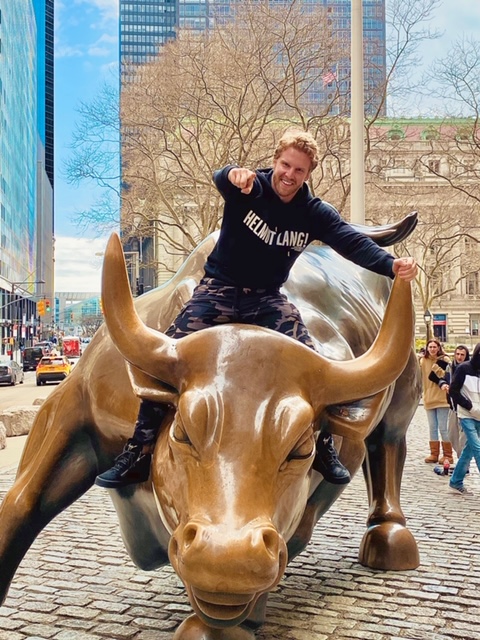Lifestyle
How Yan Stavisski Became Known As “The King Of Credit” On Instagram

As a result of massive financial debt attempting to become an entrepreneur and starting multiple business ventures, Yan was forced to make a 180-degree shift in his actions and from the age of 22, having over $80,000 worth of debt, Yan managed to create a 7-figure company called “King Credit LLC” serving thousands of clients worldwide. In early 2019 Yan became known as the “King Of Credit” after showing countless photos and videos of him traveling the world for free and living the life of a multi-millionaire all through leveraging Credit. Shortly after, Yan acquired the fitting Instagram name @kingcredit.
Despite graduating from college with both a Finance and Marketing degree, Yan found himself unemployed, even after applying for countless jobs. He always wanted to be an entrepreneur and work for himself so he decided this was his opportunity to do so. But after six months, Yan found himself in $82,000 worth of credit card debt after every one of his ventures failed. Realizing he needed skills to run a business and a better real-world financial education, Yan managed to get a sales job at which he soared to becoming the top producer in a very short period of time. While working at his sales job, Yan was learning credit and everything there was to know about it. Being laser-focused on his sales job and credit, Yan was debt-free and ready to quit his sales job due to the income he was now generating from leveraging his credit to invest in real estate.
“Getting this sales job taught me everything I need to know to actually get a business off the ground and find success,” Yan said. Realizing he was not the only one being thrown into the real-world with zero financial knowledge and certainly no skills for success, Yan decided to start “King Credit LLC” with the main product being “Inner Circle” which educates people about Credit and how to fix it, and properly leverage it for business, investments, and even free travel. Today, Yan’s company serves thousands of clients worldwide and is becoming known as the best resource for beginner and advanced credit education.
The name “The King Of Credit” became Yan’s nickname after just about everything Yan was doing on social media was in some way related to Credit. The luxury hotels, flights, and trips were all gotten by means of leveraging credit card points, rewards, and other methods that Yan teaches his students. Gaining lots of attention in the entrepreneurship space for being someone who has used Credit in a way most people have never seen before, Yan decided it was time to own this nickname and make it official by changing his social media handles to “@kingcredit”. Going forward, Yan is tremendously excited to educate the public on credit and finances, two things that resulted in a massive personal financial crisis for Yan, but later were important factors in allowing him to achieve financial freedom and the life most only dream of!
Lifestyle
When Seasons Shift: Dr. Leeshe Grimes on Grief, Loneliness, and Finding Light Again

Some emotional storms arrive without warning. A sudden change in weather, a holiday approaching, or even a bright sunny day can stir feelings that don’t match the world outside. For many people, the hardest seasons are not defined by temperature; they are defined by what’s happening inside, where grief and loneliness often move quietly.
This is the emotional terrain where Dr. Leeshe Grimes has spent her career doing some of her most meaningful work. As a psychotherapist, registered play therapist, retired U.S. Army combat veteran, and founder of Elevated Minds in the DMV area, she understands how deeply seasonal shifts and unresolved grief can affect people. Her upcoming books explore this very space, guiding readers through the emotional weight that can appear during different times of the year.
What sets Dr. Grimes apart is her ability to see clearly what many people overlook. Seasonal depression, for example, is usually tied to winter months. But she often sees it appear during warm, bright seasons, the times when the world seems happiest. For someone already grieving or feeling disconnected, watching others travel, celebrate, or gather can create its own kind of heaviness. Sunshine doesn’t always lift the mood; sometimes it highlights what feels missing.
The same misunderstanding surrounds grief. Society often treats it as a short-term experience with predictable phases and a clean ending. But in her practice, Dr. Grimes sees how grief keeps evolving. It doesn’t disappear on a timeline. It weaves itself into routines, memories, and milestones. People learn to carry it differently, but they rarely leave it behind completely. And that’s not failure, it’s human.
Her approach to mental health centers on truth rather than pressure. She encourages clients to acknowledge the emotions they try to hide: sadness that lingers longer than expected, moments of joy that feel out of place, and the waves of loneliness that return even when life seems stable. Instead of pushing for quick recovery, she focuses on helping people understand how emotions shift and how to care for themselves through those changes.
Much of her insight comes from her military years, where she witnessed the emotional toll of loss, transition, and constant survival. She saw how people continued functioning while carrying pain that had nowhere to go. That experience shaped her belief that healing requires space, space to feel, to speak, and to move through emotions without judgment.
In her clinical work today at Elevated Minds, she encourages people to build small, steady habits that anchor them during difficult seasons. Journaling helps them recognize patterns and name what feels heavy. Community support breaks the cycle of isolation. Therapy creates a place where emotions don’t have to be minimized or explained away. And intentional routines, daily sunlight, mindful breaks, and calm evenings help rebuild emotional balance.
Her upcoming books expand on these ideas, offering practical guidance for navigating both grief and seasonal depression. She focuses on helping readers understand that healing is not about escaping pain. It’s about learning how to live with it in a healthier way, honoring memories, acknowledging loneliness, and still allowing room for moments of light.
What makes Dr. Leeshe Grimes a compelling voice in mental health is her ability to bring language to experiences that many struggle to explain. She reminds people that emotional seasons don’t always match the weather and that there is no single path through grief. But within those shifts, she believes there is always a way forward.
The seasons will continue to change. And with the right tools, compassion, and support, people can change with them, finding steadiness, softness, and light again, one step at a time.
-

 Tech5 years ago
Tech5 years agoEffuel Reviews (2021) – Effuel ECO OBD2 Saves Fuel, and Reduce Gas Cost? Effuel Customer Reviews
-

 Tech6 years ago
Tech6 years agoBosch Power Tools India Launches ‘Cordless Matlab Bosch’ Campaign to Demonstrate the Power of Cordless
-

 Lifestyle7 years ago
Lifestyle7 years agoCatholic Cases App brings Church’s Moral Teachings to Androids and iPhones
-

 Lifestyle5 years ago
Lifestyle5 years agoEast Side Hype x Billionaire Boys Club. Hottest New Streetwear Releases in Utah.
-

 Tech7 years ago
Tech7 years agoCloud Buyers & Investors to Profit in the Future
-

 Lifestyle5 years ago
Lifestyle5 years agoThe Midas of Cosmetic Dermatology: Dr. Simon Ourian
-

 Health7 years ago
Health7 years agoCBDistillery Review: Is it a scam?
-

 Entertainment7 years ago
Entertainment7 years agoAvengers Endgame now Available on 123Movies for Download & Streaming for Free
